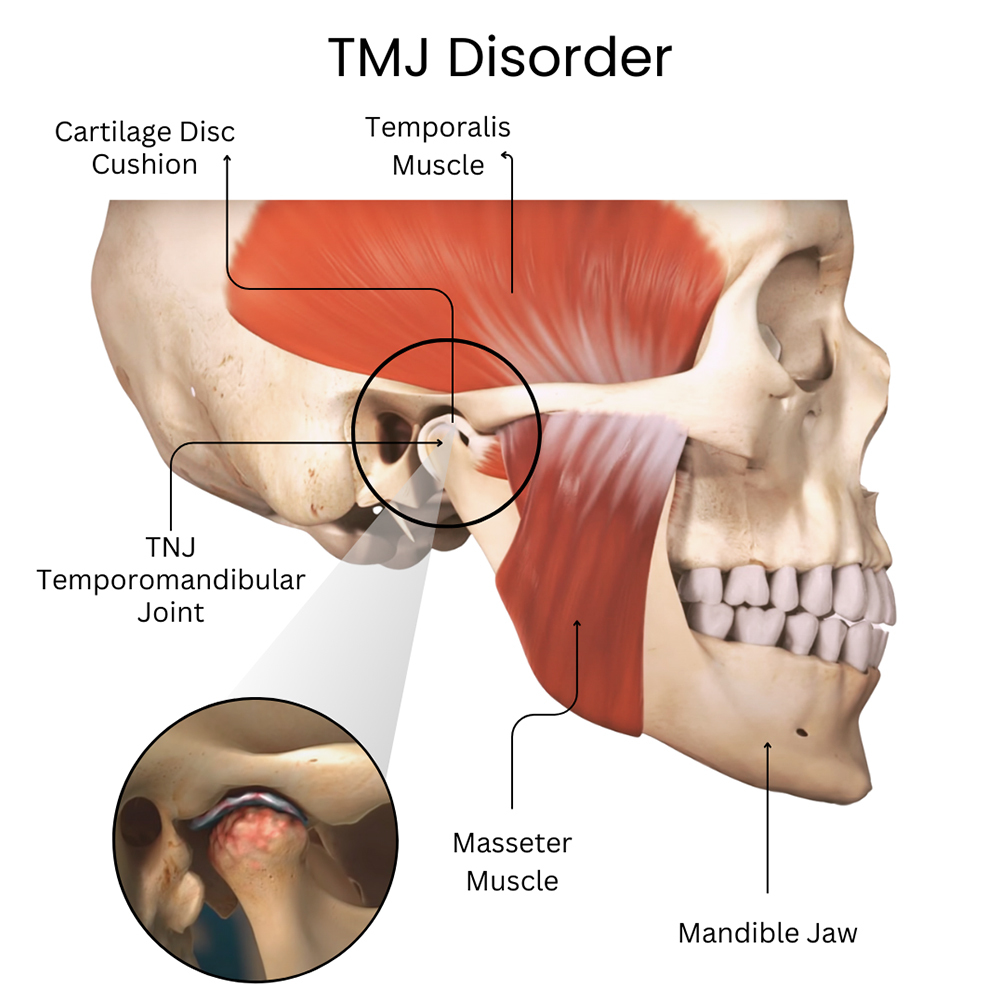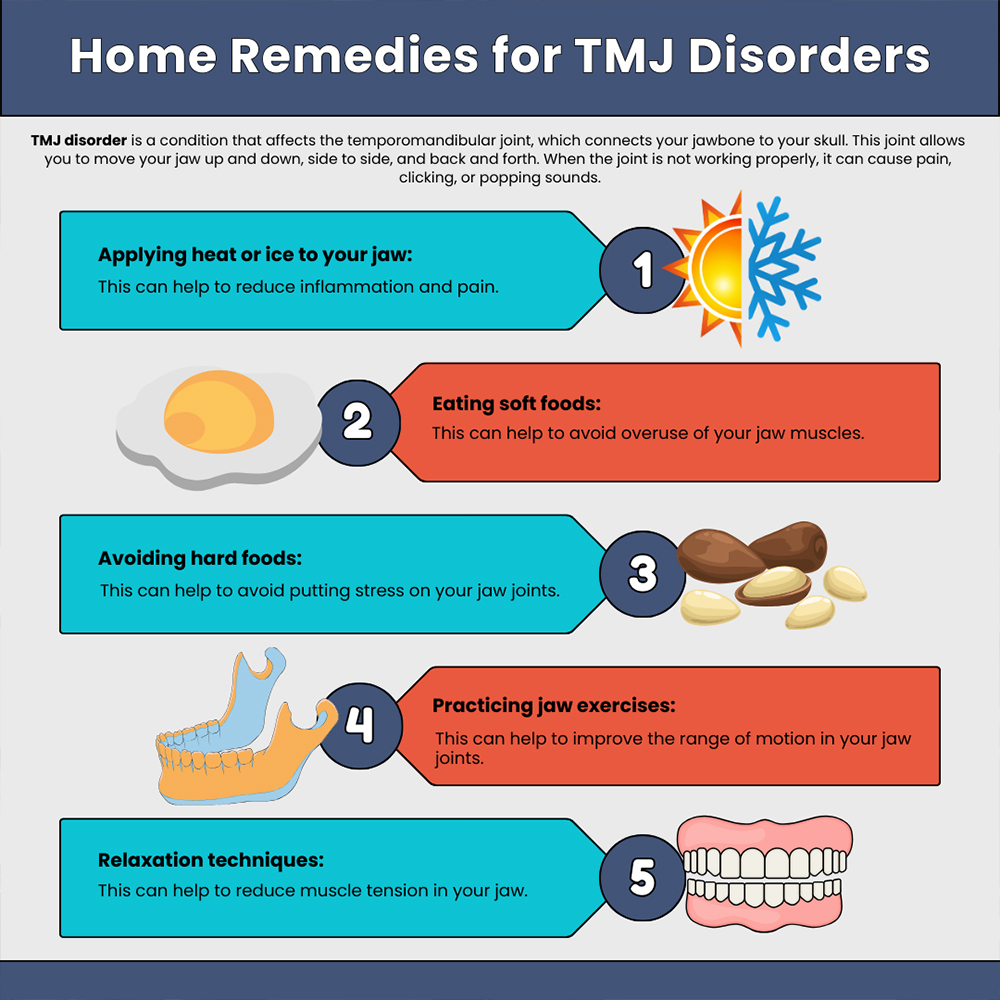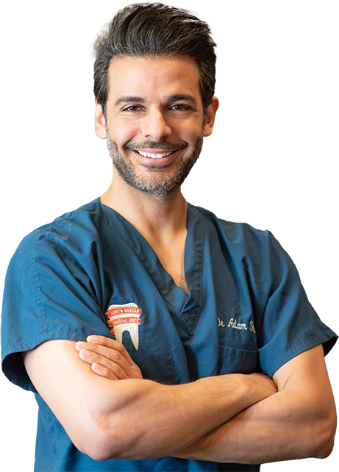 85 North Park Avenue Rockville Centre, NY 11570
(516) 763-4500
85 North Park Avenue Rockville Centre, NY 11570
(516) 763-4500
 85 North Park Avenue Rockville Centre, NY 11570
(516) 763-4500
85 North Park Avenue Rockville Centre, NY 11570
(516) 763-4500

Often, it is difficult to identify the exact reason for temporomandibular joint disorder. Sometimes it can be due to a combination of factors like an injury to your jaw joints, so the disc moves out of place or becomes eroded, genetics, or arthritis.
Arthritis can damage the cartilage of the joint. People who clench and grind their teeth (bruxism) can place the jaw joints under considerable stress, resulting in these joints becoming inflamed and painful. However, some people with bruxism will never develop TMJ disorders.
The signs include pain or tenderness in your jaws that may affect one or both of your temporomandibular joints.
The pain can spread to your ears, causing earache. It can become difficult to chew food properly or open your mouth comfortably, and the jaw joints may become locked in position. When you open your mouth, your jaw joints might make a clicking or popping sound.
If you have noticed your jaw joints feel painful and inflamed, please visit South Nassau Dental Arts. Our dentist, Dr. Adam Shoukry, will gently examine your jaws to assess the range of motion and may feel gently around the jaw to identify any painful or uncomfortable areas.
We will almost certainly take dental x-rays to help examine your teeth and jaw joints in more detail. Sometimes we may recommend you have a CT scan or an MRI scan that can help provide more information. A CT scan allows us to assess your jawbone in greater detail, while an MRI can help identify problems with the disc in the temporomandibular joint or an issue with the soft tissue surrounding the joint.
Best dental experience ever. Professional and very clean office. Everyone from the receptionist to the hygienist to the dentist are amazing. So friendly and patient. You can even watch TV while getting work done on your teeth!
Sometimes the symptoms of temporomandibular joint disorder will disappear without treatment, but if they continue, we can recommend several solutions, sometimes combining more than one treatment for an optimal outcome.
Possible treatments may include medications and therapy, and very rarely surgery.
Medication can be useful for helping to relieve the discomfort and pain of inflamed temporomandibular joints. We might recommend using over-the-counter medications or can prescribe something stronger if needed.
Sometimes antidepressants are used in low doses to provide pain relief and help control bruxism. Another option is to use a muscle relaxant, as this can help treat the pain caused by muscle spasms that sometimes result from TMJ disorders.
Corticosteroid injections into the joint can relieve the pain of TMJ disorders. Botox injections can also sometimes be useful in helping to relax the jaw muscles used for chewing.
One of the most useful therapies for temporomandibular joint disorder is to have a custom-made mouthguard. The mouthguard can be made from a firm or soft material and helps place your jaw in a more relaxed position, and can be a very successful treatment for TMJ pain and discomfort.
Another therapy is to use special facial exercises that help to strengthen and stretch your jaw muscles. These exercises might be combined with moist heat, ice packs, and ultrasound treatments.
Dental education can help you learn how certain behaviors can aggravate TMJ disorders, so you can take care to avoid them. For example, biting your nails or teeth clenching and grinding habits can contribute to TMJ disorders.
Surgery is rarely required, and we will only usually suggest this option after trying other treatments. If we think you need surgery, we can refer you to a TMJ specialist who will assess the condition of your jaw joints and discuss possible surgical procedures that could help.
The least invasive is an arthrocentesis procedure performed under local anesthesia and uses sterile fluids to help wash out the jaw joint. Arthroscopy is a surgical technique that can help remove inflamed jaw joint tissue or realign damaged discs. Open joint surgery is more invasive, requiring a longer healing time but can be the best solution when a jaw joint is severely worn or scarred.
Home remedies can work very well, especially when used with professional dental care treatments. These include becoming aware of any habits that could increase tension in your jaw joints, such as chewing pencils or clenching your teeth.
It can be helpful to avoid eating very sticky or hard, or chewy foods that could overuse your jaw muscles. Instead, choose softer foods that require minimal chewing and cut food into small pieces before eating. We can show you simple stretching exercises for your jaw muscles to carry out at home. We can also explain how to massage your facial muscles gently.
Try to avoid extreme jaw movements, so keep chewing and yawning to a minimum and pay attention to your posture as this can help reduce neck and facial pain. Practice keeping your teeth slightly apart during the day, helping to relieve pressure on your jaw joints.

You could also try to learn some relaxation techniques to help reduce muscle tension in your jaw.
While your TMJ disorder may disappear without treatment, it can also lead to significant health problems if it continues untreated. Long-term TMD can cause chronic pain and inflammation in your jaw joints.
It can also lead to problems with your bite, especially if you have bruxism and where teeth grinding damages teeth significantly. Untreated TMD can cause serious conditions like depression and anxiety, sleeplessness, and sleep apnea.

Dr. Adam Shoukry, DDS, is a cosmetic dentist who strives to provide each of his patients with personalized care and educate them on the state of their dental health so that they can make informed decisions. Dr. Shoukry really enjoys his work and is committed to continued education, having attended several accredited courses in every aspect of dentistry.
Dr. Shoukry graduated from NYU College of Dentistry with a Doctor of Dental Surgery degree and then completed his general practice residency at Nassau University Medical Center. Being a member of the American Dental Association, the Academy of General Dentistry, and the American Academy of Cosmetic Dentistry, Dr. Shoukry strives to provide comprehensive dental examinations, a full range of cosmetic treatments, and the best restorative oral health care available.